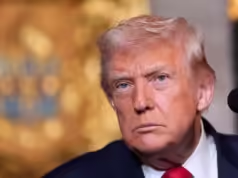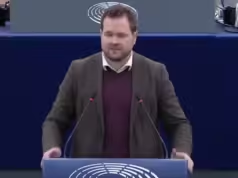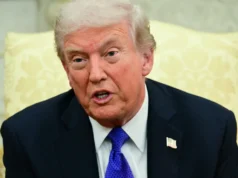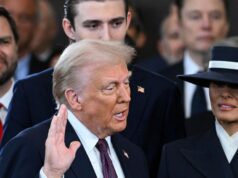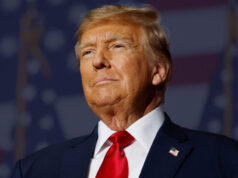Donald Trump Visit to the Middle East: This meeting was perhaps the most important of all of President Trump’s encounters and meetings, and it has changed the geopolitical environment in central and west Asia.
During his brief visit to the Middle East, Donald Trump met with Ahmad al-Sharaa, the interim president of Syria, in Saudi Arabia today, writing history. The geopolitical environment in central and west Asia has changed as a result of this meeting, which was perhaps the most important of all of President Trump’s encounters and meetings.
WHAT CAUSED HEADS TO TURN GLOBALLY
First, President Trump’s encounter with President al-Sharaa caused a stir due to the latter’s dubious past. Ahmad al-Sharaa, a US-designated terrorist and a UN-prohibited individual, was known until recently by his alias, Abu Mohammad al-Jawlani (often spelled al-Golani or al-Joulani).
Al-Jawlani has had important roles in international terrorist groups such as Al Qaeda and ISIS for the past 20 years. A global terrorist, Abu Mohammed al-Jawlani was designated in July 2013 for “participating in the financing, planning, facilitating, preparing, or perpetrating acts of terror” by the ‘ISIS and Al Qaeda Sanctions Committee’ of the United Nations Security Council.
FROM WORLD TERRORIST TO PRESIDENT OF SYRIA
He was also found guilty of “supplying, selling or transferring arms” and “recruiting for” Al Qaeda and ISIS, according to the UN Security Council sanctions committee. He worked closely with Aiman al-Zawahiri, the leader of Al Qaeda at the time, and Abu Bakr al-Baghdadi, the leader of ISIS at the time (also known as Ibrahim Awwad Ibrahim Ali Al-Badri Al-Samarrai).
Abu Bakr al-Baghdadi gave Al-Jawlani instructions to create a front for Al Qaeda in Iraq and Syria by building a local presence in 2011, the year of the Syrian uprising against the Assad administration, which was supported by Russia and Iran.
Al-Jawlani established the Al-Nusrah Front (officially Jabhat Fatah al-Sham), also known as Jabhat al-Nusrah, in 2012. This UN-designated terrorist organization was formally recognized as Al Qaeda’s Syrian branch. Mass demonstrations against the Ba’athist government of former President Bashar al-Assad had transformed the 2011 uprising in Syria into a revolution by this point.
ASSAD REGIME BACKED BY IRAN AND RUSSIA
The Jabhat Fatah al-Sham changed its name to the Hay’at Tahrir al-Sham, or HTS, in 2017. Establishing an Islamic Caliphate and toppling the Bashar al-Assad regime were its main goals.
Over time, the Syrian revolution evolved into an armed conflict that gradually spread throughout the nation until intensifying into a full-fledged civil war. Al-Jawlani’s HTS led a surprise and huge onslaught in November 2024 that quickly cost the Assad administration significant territory, including its stronghold cities.
After 53 years of ruthlessly governing the nation, Bashar al-Assad escaped to Russia on December 8, 2024, and the Assad dictatorship fell. Since the majority of Russia’s military was focused on the Ukrainian front, Moscow was unable to assist Bashar Assad in Syria. Al-Jawlani, the head of HTS, announced victory and was named Syria’s acting president in January. At that point, he formally adopted his present name, Ahmad al-Sharaa.
US INTRODUCTION IN SYRIA
The US President’s announcement that he is easing all sanctions imposed on Syria, which have existed since 1979, was the second reason that Donald Trump’s meeting with Ahmad al-Sharaa caused concern.
Syria and the Assad government were subject to sanctions in 1979 when the US Department of State claims that the country was named “a State Sponsor of Terrorism” for giving “political and military support to various terrorist groups.” “The regime continued to provide weapons and political support to Hezbollah (Hizballah) and continued to allow Iran to rearm and finance the terrorist organisation,” it stated in an update for 2019.
THE CROWN PRINCE MBS AND SAUDI ARABIA’S ROLE
The third factor that attracted international notice was the suggestion and arrangement of the meeting between President Trump and President al-Sharaa by Saudi Crown Prince Mohammed bin Salman. Donald Trump admitted following the meeting that the Saudi prince was instrumental in today’s decisions.
In addition to the lifting of all sanctions, the White House’s statement following Donald Trump’s meeting makes it apparent that the US has acknowledged and validated the new Syrian government. As the two leaders of state met, President Trump declared, “Syria deserves a chance at peace under al-Sharaa.”
Then, President Trump urged President Al-Sharaa to do a fantastic job for the Syrian people during a meeting that was held behind closed doors. Along with signing the Abraham Accords with Israel, the US president encouraged his Syrian counterpart to evacuate all foreign terrorists from Syria.
Today, President Trump, at the invitation of Crown Prince Mohammed bin Salman, met with Syrian President Ahmad al-Sharaa. President Erdogan of Turkey joined by phone. President Erdogan praised President Trump for lifting sanctions on Syria and committed to working alongside Saudi… pic.twitter.com/0yhyZbQ1o0
— Karoline Leavitt (@PressSec) May 14, 2025
The Turkish equation and gulf-backing
The meeting took on significance for Asia for a fourth reason: Donald Trump and al-Sharaa of Syria were joined by President Erdogan of Turkey by phone throughout the meeting.
As a potential counterweight to Iran, a number of Gulf countries have also backed Syria’s new government, putting Tehran-backed Assad in the annals of history.
A WARNING FROM ISRAEL TO THE US
The United States’ recognition of Ahmad al-Sharaa as the president of Syria has angered Israel. Because of its history of terrorism, Tel Aviv has warned Washington against endorsing the new government.
But with the lifting of sanctions and the historic summit today, a new era has dawned in West Asia and the Middle East (Gulf). Perhaps one of the most remarkable transformations in geopolitical history is Ahmad al-Sharaa’s quick ascent from a UN-designated global terrorist to Syria’s new president, who now has official links with the United States.
Donald Trump’s announcement today was greeted as a “pivotal turning point” in Syria’s history by the country’s foreign ministry. “The removal of these sanctions offers a vital opportunity for Syria to pursue stability, self-sufficiency, and meaningful national reconstruction, led by and for the Syrian people,” their foreign office stated in a statement.
